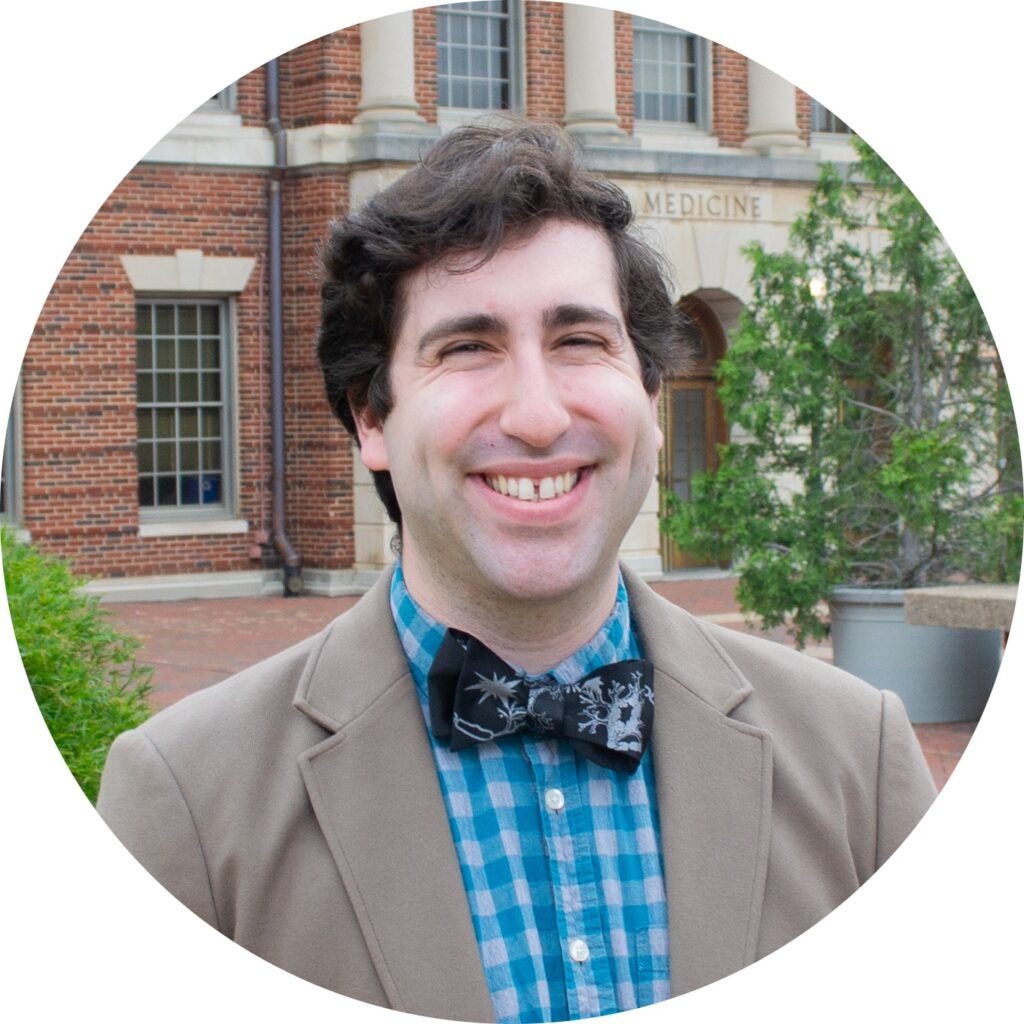
2020 NIDCD Ruth L. Kirschstein National Research Service Award (F30)
I believe that nothing we do as scientists has much value if only those in our field can understand it.
About Joseph
Joseph is a student in the M.D./Ph.D. program within the Interdisciplinary Program in Neuroscience. He is in his ninth and final year of studies, having already completed his thesis work on the reading network in persons with aphasia.
“I grew up in a suburb of Baltimore, Maryland. I went to the Community College of Baltimore County as a Chemistry major, and then the University of Maryland, Baltimore County, as a Biochemistry major. Between these degrees, I participated in the NIH Community College Summer Enrichment Program. Pursuing neuroscience, I then worked with Argye Hillis, M.D., at Johns Hopkins, while applying to the M.D./Ph.D. program at Georgetown, where I’ve been for the past 8 years.
“During my thesis work, I had the privilege of working with both Rhonda Friedman, Ph.D., and Peter Turkeltaub M.D., Ph.D., as my research mentors, while I studied the reading network in persons with aphasia, and how reading processes relate to general language both cognitively and neurally.
“Besides research, I like cooking and enjoying good food, climbing, and playing DnD with my friends.”
Tell us about the award you received.
The 2020 National Institute on Deafness and Other Communication Disorders (NIDCD) Ruth L. Kirschstein National Research Service Award (F30) is an NRSA that funds M.D./Ph.D. students. A predoctoral fellowship funding training in both research and medicine, it supplements tuition and provides a stipend for the remaining years of training.
What does this award mean to you?
Getting an NRSA award to me means the promise of a future in this field. There is the idea that once you get one grant, you are likely to get more. But aside from the momentum of funding, there is the simple fact that someone thought that my ideas showed enough promise to fund not only my research, but my education. To me that means I am not the only one who thinks my research is interesting, and I’ll be able to do more of it in the future. And while it isn’t good to live your life by what others think of you, from time to time it helps to have concrete evidence that, on the scale of an NIH institute, someone thought that my ideas were worth investing in.
Why did you choose Georgetown BGE for your doctoral studies?
Being in an M.D./Ph.D. program is a big commitment, 8 years (9 in my case). And I picked Georgetown to do this degree specifically because of the Interdisciplinary Program in Neuroscience (IPN). Beyond the labs that were researching topics I was interested in, it was the prospect of working with the faculty and the students that excited me the most. I saw that people in the IPN created a close-knit and extremely supportive scientific community. In the program, everyone knew each other, came to each other’s talks, and celebrated each other’s successes. And this welcoming and collaborative environment drew me in.
What’s your advice for other students interested in applying for this award or other external awards?
Apply! It sounds cliché, but you get rejected from every application you don’t fill out. If you see a grant or award that you technically qualify for, even if you think it’s a long shot, go for it! As long as you have the time to submit the application, you never know if the applicant pool is small, if the reviewer is having a good day today, or if you simply are doing something that a lot of people are interested in funding.
Once you start writing the application, get as many eyes on it as possible. Your mentor is a fantastic resource, but a postdoc in your lab, other students, even a family member with no scientific training can also be helpful. Everyone will have a different perspective. And even if it’s just catching a typo that everyone else missed, the more people who see your work, the better it will be.
If you could meet one scientist, who would it be?
I took this question in so many different ways – “Who would be the coolest to meet?” (Nikola Tesla), “Who would I love to talk about their research with?” (Ev Fedorenko, Ph.D.) – but I think if I had to pick one person to meet, it would be Stanislas Dehaene, Ph.D. He is an amazing researcher, and has added so much to studying language and reading in the brain. But he has also done what even some the best scientists often fail at: effectively communicating their work to the general population. He has taken his and others’ research and published several books that make that research accessible.
I believe that nothing we do as scientists has much value if only those in our field can understand it. I would want to talk with him about how he takes something as complex as the language network, and turns it into a work that is both useful to those in his field, and digestible by those who may have little to no formal scientific training. It’s a skill that I think is vital to being a scientist, and I would love to learn all I can from him about it.
